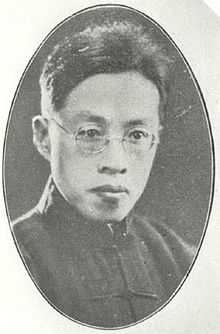Ch'ien Mu
 | |
| Born |
30 July 1895 Jiangsu |
|---|---|
| Died |
30 August 1990 (aged 95) Hangzhou South Road, Zhongzheng District, Taipei |
| Era | 20th century philosophy |
| Region | Chinese Philosophy |
| School | Confucianism |
Ch'ien Mu, also romanized as Qian Mu (Chinese: 錢穆; 30 July 1895 – 30 August 1990), courtesy name Binsi (賓四), was a Chinese historian, educator, philosopher and Confucian considered one of the greatest historians and philosophers in 20th-century China.
Life in China and Hong Kong
His biographer sketches the "economic mold" of Seven Mansions, his ancestral home in Wuxi, to suggest that in his childhood world the "small peasant cosmos" of rituals, festivals, and beliefs held the family system together. He received little formal modern education, but gained his knowledge on Chinese history and culture through traditional home study.[1]
After teaching in universities in mainland China starting the in 1920s, he arrived in Hong Kong in 1949. With help from the Yale-China Association, along with other scholars he cofounded New Asia College.[2] He later received honorary doctorates from both Yale University and Hong Kong University.[3]
Life in Taiwan
Ch'ien relocated to Taiwan in October 1967 after accepting an invitation from the then President Chiang Kai-shek in response to the Hong Kong 1967 Leftist Riots. He was given land in Waishuangxi in the Shilin District to build his home Sushulou (素書樓) while continuing as a freelance academic researching and giving lectures at universities in Taiwan. Ch'ien retired from teaching in 1984. After becoming one of the three constituent colleges of the Chinese University of Hong Kong, in 1978 New Asia College inauguated the Ch'ien Mu Lectures in his honor.
On June 1, 1990 the then Legislative Yuan members Chen Shui-bian (later the 10th and 11th President of the Republic of China) and Chou Po-lun, both of the Democratic Progressive Party (Taiwan) espousing the Taiwan Independence Movement, had accused Chien of occupying public land as the nature of gifting the land for Xushulau by Chiang Kai-shek was deemed to be illegal by Chen and Chou. Ch'ien and his wife moved out of Xushulau and relocated to a high-rise apartment in downtown Taipei City.
Ch'ien died on August 30 of 1990 a little less than three months after being forced to move out of Xushulau. Many of Chien's supporters, including his former students and many members of the public, have condemned the practice Chen and Chou of using Chien for scoring political points against the KMT which they believed caused his unnecessarily early death. Both Chen and Chou have since apologized for the damages of their accusations towards Chien, and Xushulau is now the location of the Chien Mu Memorial.
Works
Ch'ien wrote extensively on Chinese classics, history and Confucian thought. Unlike many 20th-century Chinese intellectuals influenced by the New Culture Movement of the 1910s who are fundamentally skeptical of traditional Chinese thought and Confucianism, he insisted on the importance of traditional values of Chinese culture. By the time of his death in 1990, his objections to the rejection of tradition of Confucianism had gained wider credence, partly through the influence of his student at New Asia College, Yu Ying-shih.[4]
Criticism
Critics of Chien's ideas, such as Li Ao, tend to focus on his superficial knowledge of non-Chinese currents of thoughts when he wrote his treatises on cultural studies, and his lack of objective, scientific method-based, defense of traditional Chinese culture. Wang Yongzu (Wong Young-tsu) condemns Chien's own bias as "19th century traditionalist" in his "A Comment on Chien Mu's Treatise on Chinese Scholarships During the Qing Dynasty" (錢穆論清學史述評) being unable to view 19th century currents of thoughts with contemporary (20th century) perspectives. It could be argued, however, the opposition is based upon the critics' support of the New Culture Movement's legacies, which Chien explicitly rejected.
Another recurring theme from Ch'ien's critics, from the 1930s onwards, concerns his defense of traditional Chinese political system, headed by a monarch but with the government filled by examinations-based mandarins, as a representative form of government, as a simplistic fantasy.
In his survey, Traditional Government in Imperial China: A Critical Analysis Ch'ien describes the basic constitutive elements of China's traditional government as it evolved. He concentrates upon those dynasties he considers China's most representative: the Han, Tang, Song, Ming and Qing; and critically analyzes and compares their governmental organization, civil service examination system, taxation and defence.
Memorial
- New Asia College Ch'ien Mu Library
Notes
- ↑ Pt I, Jerry Dennerline Qian Mu and the World of Seven Mansions (New Haven: Yale University Press, 1988).
- ↑ "About New Asia: History". Chinese University of Hong Kong. Retrieved 13 January 2014.
- ↑ "Traditional Government in Imperial China: A Critical Analysis".
- ↑ Hung-yuk Ip, Tze-ki Hon, Chiu-chun Lee, "The Plurality of Chinese Modernity: A Review of Recent Scholarship on the May Fourth Movement," Modern China 29.4 (2003): 490-509.
Further reading
- Jerry Dennerline, Qian Mu and the World of Seven Mansions (New Haven: Yale University Press, 1988).
External links
- Chienmu's House in Shilin
- 近代的中国人,只因我们一时科学落后,遂误以为中国以往历史上一切文物制度全都落后了。”(《中国历史研究法》
- 钱穆在《中国历代政治得失》中深刻揭示“清朝是导致中国落后的根源
- 军机处则明明是一种军事统治的名称。既然最高法令均属于军机,当然只能说它是军事统治了
| Preceded by None |
President of New Asia College 1949-1965 |
Succeeded by Wu Chun-xing |
|